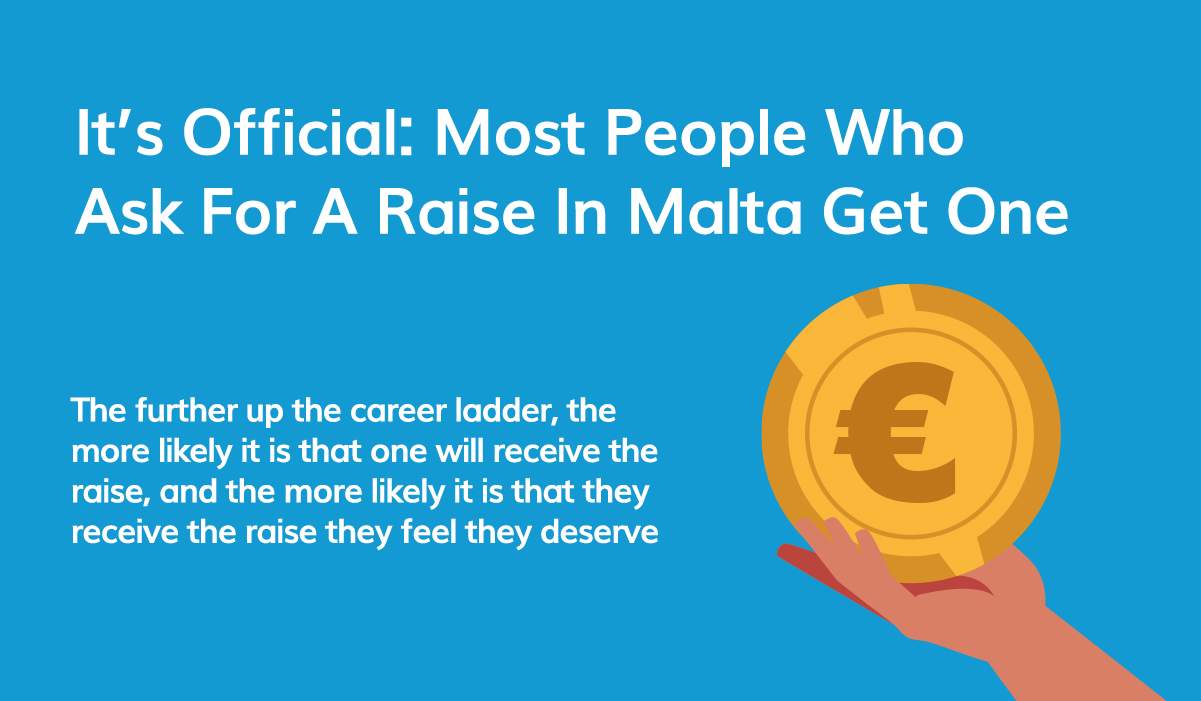Getting a raise might not be as difficult as some believe. Turns out the main thing you need to do is get the confidence to actually demand one.
According to Keepmeposted’s recent survey about salary raises, two-thirds of workers in Malta who asked for a raise were successful, even if they weren’t all happy with the amount itself.
Only 35% of workers who asked for a raise were refused, and this rejection seems to be tied with the seniority of employees. The further up the career ladder, the more likely it is that one will receive the raise, and the more likely it is that they receive the raise they feel they deserve.

It is only unskilled workers who are more likely to get their raise request rejected outright. But even for unskilled workers, it’s better to ask than to assume you won’t get one. Even though 52% of unskilled workers who demanded a raise were refused, 48% were given a bump in their salary – even if it did not meet their expectations.
Meanwhile, 100% of respondents in top management received a “good enough raise” but only 6.67% of respondents who identified as “entry-level” felt they received a good enough raise.
There is virtually little to no difference in statistics between male and female respondents in our survey. Female respondents are (only) slightly more likely to feel they got a good enough raise at 19.6%, compared to 17.5% of male respondents.
However, even at mid-Management level, 50% of female respondents still didn’t feel they had the confidence to ask for a raise, whilst for male respondents, only those in non-managerial roles responded that they lacked the confidence to ask for a raise.
The younger, male, cohort of respondents, those aged between 18 and 30, were more likely to feel they got a good enough raise, and, indeed, only 12.5% of this age group didn’t receive a raise. Unfortunately, there is a staggering difference for female respondents in this category, where 33.3% didn’t receive a raise. However, 33.3% felt they got a good enough raise when they asked, which is higher than the 25.3% of male respondents.
In total, 56.4% of respondents aged between 31 and 45 received a raise when they asked. Of those who asked in the older age group of 46-60, an overwhelming majority of 80% received a raise, although only 12% of those who received a raise felt it was good enough.
As our statistics show, the compelling reality is that more often than not what gets between you and a raise is the confidence to ask for it. Truthfully, asking for a raise is not something one does every day so it’s natural to be anxious about it.
There’s one thing left to do: start laying the groundwork for yourself and ask for that raise.
- Write down your achievements, and make an objective list as to why you are an asset to the company.
- Know the market. Ask around and know what your peers and people with your experience and background are earning. Perhaps apply for a few jobs before so that you get an insight into your worth.
- Remind yourself that you have supporting evidence: you did your research and you know you deserve it.
- Rehearse with a friend or family member. This will help you be more confident in what you need to say when you’re with your boss.
Bonus: Take a deep breath, think positive thoughts and go for it. Ask for a meeting with your boss and speak about your expectations. You can do this!
The worst that can happen is that you don’t get a raise, but even if that’s the case, you can ask your boss what you need to do to earn that raise and you might have better luck next time
Has a lack of confidence ever stopped you from asking for a raise? Share this article with a friend who needs to hear it!

